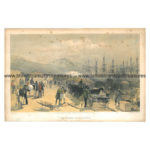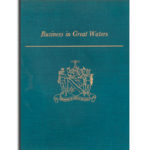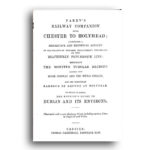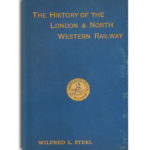Description
Thomas Brassey (7 November 1805 – 8 December 1870) was an English civil engineering contractor and manufacturer of building materials who was responsible for building much of the world’s railways in the 19th century. By 1847, he had built about one-third of the railways in Britain, and by time of his death in 1870 he had built one in every twenty miles of railway in the world. This included three-quarters of the lines in France, major lines in many other European countries and in Canada, Australia, South America and India. He also built the structures associated with those railways, including docks, bridges, viaducts, stations, tunnels and drainage works.
Brassey built docks at Greenock, Birkenhead, Barrow-in-Furness and London. His London docks were the Victoria Docks which had a water area of over 100 acres. The contract for this was agreed in 1852 in partnership with Peto and Betts and the docks were opened in 1857. Also included in the contract were warehouses and wine vaults an area in total of about 25 acres. The dock had links to Brassey’s London, Tilbury and Southend Railway and thereby to the entire British railway system.
During this contract the partners also undertook the transport of men and materials for, and construction of, the military railway linking Balaklava with the British siege lines outside Sevastopol, where the allied armies were bogged down starving and short of ammunition. This was carried out for repayment of costs only, with no profit or commission. See :
In 1861 Brassey built a stretch of the Metropolitan Mid- Level Sewer of 12 miles which started at Kensal Green, passed under Bayswater Road, Oxford Street and Clerkenwell to the River Lea. It was one of the earliest ventures to use steam cranes. The undertaking was considered to have been one of Brassey’s most difficult assignments. The sewer is still in operation today. He also worked with Bazalgette to build the Victoria Embankment on the north bank of theRiver Thames from Westminster Bridge to Blackfriars Bridge.
Brassey gave financial help to Brunel to build his ship The Leviathan, which was later calledThe Great Eastern and which in 1854 was six times larger than any other vessel in the world. Brassey was a major shareholder in the ship and after Brunel’s death, he, together with Gooch and Barber, bought the ship for the purpose of laying the Transatlantic telegraph cable across the North Atlantic in 1864.
At the peak of his career, for well over 20 years, Brassey was employing on average some 80,000 people in many countries in four continents.
Despite this he had neither an office nor office staff, dealing with all the correspondence himself. Much of the details of his contracts were held in his memory. He travelled with a personal valet and later had a cashier, but all his letters were written by him; it is recorded that on one occasion after the rest of his party had gone to bed, 31 letters had been written by Brassey overnight. Thus were fortunes made.
And yet Brassey made his, without a single navvy, employee, partner, commissioning engineer or other client having an ill word to say about him. Truly a remarkable character.
On 8 December 1870 Thomas Brassey died from a brain haemorrhage in the Victoria Hotel, St Leonards .His estate was valued at £5,200,000, which consisted of “under £3,200,000 in UK” and “over £2,000,000” in a trust fund. At 2015 values the trust fund alone was worth a mind boggling £91,400,000.00!
This is a fascinating biography of an amazing man, by a contemporary who was able to speak to many people who had known him.
PREVIEW BELOW – MAY TAKE A WHILE TO LOAD.








Reviews
There are no reviews yet.